Entrepreneurship: Venture Types, Economy Impact & Mind-set Analysis
VerifiedAdded on 2024/06/04
|21
|5300
|482
Report
AI Summary
This report explores various aspects of entrepreneurship and its ventures, focusing on the typology of entrepreneurial ventures and their similarities and differences. It assesses the impact of small businesses and start-ups on the UK economy, highlighting their role in economic and social development. The report also examines the key aspects of an entrepreneurial mindset, differentiating successful entrepreneurs from other business managers and analyzing how entrepreneurial personality reflects motivation. Finally, it investigates the environments that foster or hinder entrepreneurship, using examples to illustrate the influence of background and experience. The report emphasizes the importance of small and medium-sized enterprises (SMEs) in the UK economy, citing statistics on turnover, employment, and growth, while also acknowledging the role of large enterprises in economic development.

1
Paraphrase This Document
Need a fresh take? Get an instant paraphrase of this document with our AI Paraphraser

Entrepr
eneursh
ip and
Small
Busines
s
Manage
ment
Table of Contents
Introduction...........................................................................................................................................3
LO1: Explore and illustrate the range of venture types that might be considered entrepreneurial.........4
2
eneursh
ip and
Small
Busines
s
Manage
ment
Table of Contents
Introduction...........................................................................................................................................3
LO1: Explore and illustrate the range of venture types that might be considered entrepreneurial.........4
2
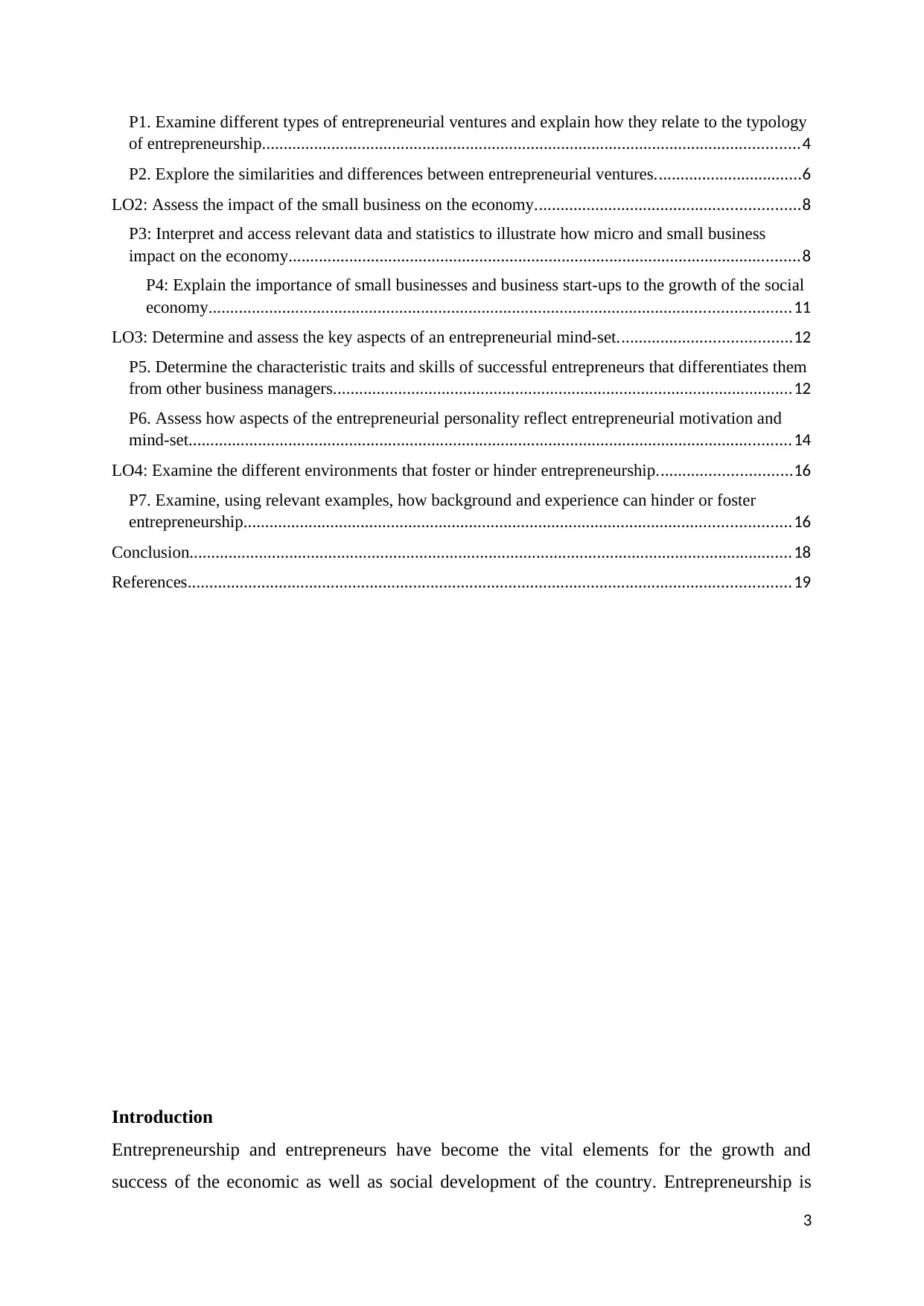
P1. Examine different types of entrepreneurial ventures and explain how they relate to the typology
of entrepreneurship............................................................................................................................4
P2. Explore the similarities and differences between entrepreneurial ventures..................................6
LO2: Assess the impact of the small business on the economy.............................................................8
P3: Interpret and access relevant data and statistics to illustrate how micro and small business
impact on the economy......................................................................................................................8
P4: Explain the importance of small businesses and business start-ups to the growth of the social
economy......................................................................................................................................11
LO3: Determine and assess the key aspects of an entrepreneurial mind-set........................................12
P5. Determine the characteristic traits and skills of successful entrepreneurs that differentiates them
from other business managers..........................................................................................................12
P6. Assess how aspects of the entrepreneurial personality reflect entrepreneurial motivation and
mind-set...........................................................................................................................................14
LO4: Examine the different environments that foster or hinder entrepreneurship...............................16
P7. Examine, using relevant examples, how background and experience can hinder or foster
entrepreneurship..............................................................................................................................16
Conclusion...........................................................................................................................................18
References...........................................................................................................................................19
Introduction
Entrepreneurship and entrepreneurs have become the vital elements for the growth and
success of the economic as well as social development of the country. Entrepreneurship is
3
of entrepreneurship............................................................................................................................4
P2. Explore the similarities and differences between entrepreneurial ventures..................................6
LO2: Assess the impact of the small business on the economy.............................................................8
P3: Interpret and access relevant data and statistics to illustrate how micro and small business
impact on the economy......................................................................................................................8
P4: Explain the importance of small businesses and business start-ups to the growth of the social
economy......................................................................................................................................11
LO3: Determine and assess the key aspects of an entrepreneurial mind-set........................................12
P5. Determine the characteristic traits and skills of successful entrepreneurs that differentiates them
from other business managers..........................................................................................................12
P6. Assess how aspects of the entrepreneurial personality reflect entrepreneurial motivation and
mind-set...........................................................................................................................................14
LO4: Examine the different environments that foster or hinder entrepreneurship...............................16
P7. Examine, using relevant examples, how background and experience can hinder or foster
entrepreneurship..............................................................................................................................16
Conclusion...........................................................................................................................................18
References...........................................................................................................................................19
Introduction
Entrepreneurship and entrepreneurs have become the vital elements for the growth and
success of the economic as well as social development of the country. Entrepreneurship is
3
⊘ This is a preview!⊘
Do you want full access?
Subscribe today to unlock all pages.

Trusted by 1+ million students worldwide

responsible for the local, regional as well as the national economic development of the
country. The following report will discuss the various aspects of the entrepreneurship and its
various different ventures with respect to the typology. In the following assignment, we will
discuss the various entrepreneurial ventures and the similarities and differences between each
of them. We will also focus light on the importance of the small businesses and business
start-ups for the economy of the country and how they lead to the social development of the
country.
4
country. The following report will discuss the various aspects of the entrepreneurship and its
various different ventures with respect to the typology. In the following assignment, we will
discuss the various entrepreneurial ventures and the similarities and differences between each
of them. We will also focus light on the importance of the small businesses and business
start-ups for the economy of the country and how they lead to the social development of the
country.
4
Paraphrase This Document
Need a fresh take? Get an instant paraphrase of this document with our AI Paraphraser
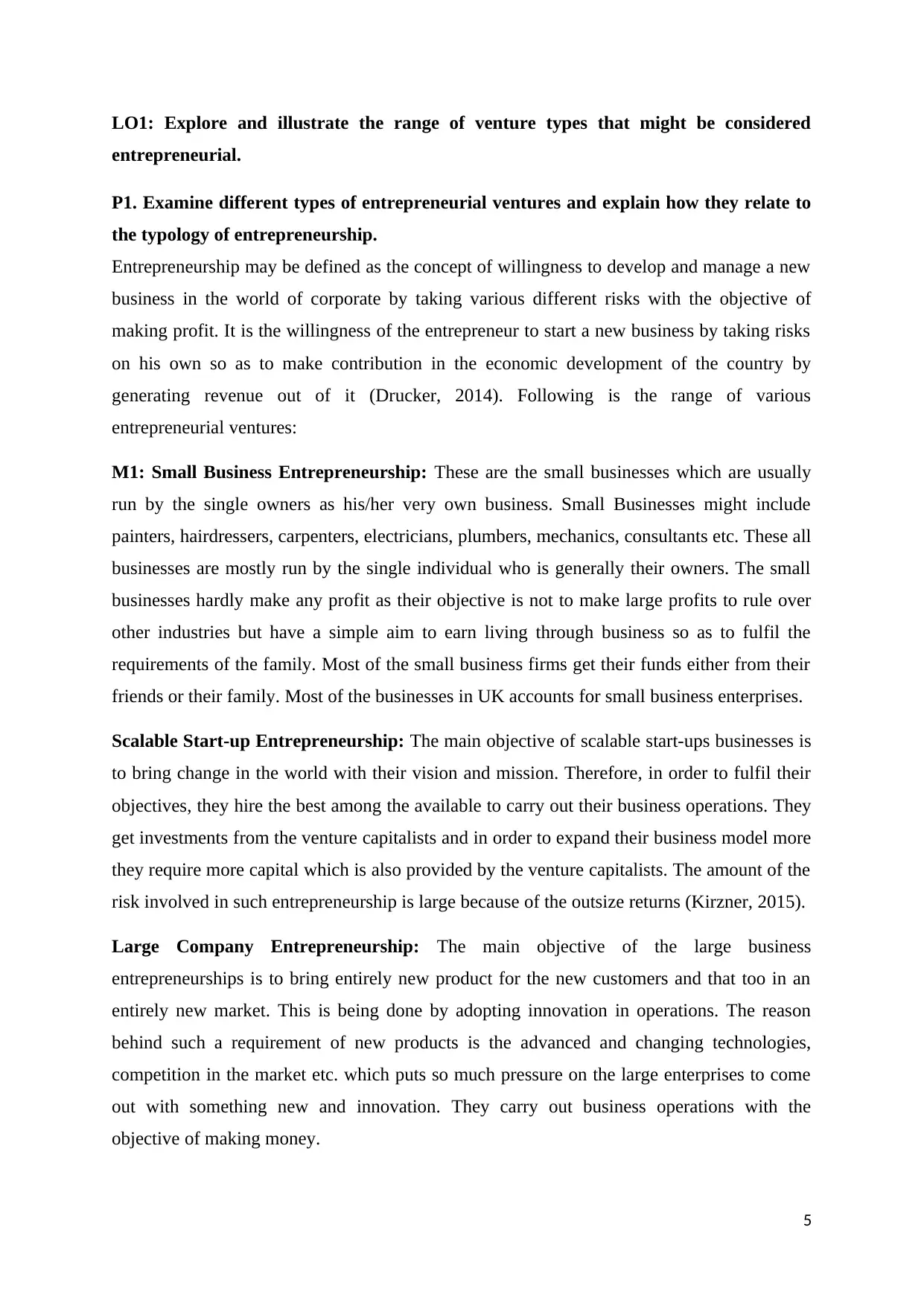
LO1: Explore and illustrate the range of venture types that might be considered
entrepreneurial.
P1. Examine different types of entrepreneurial ventures and explain how they relate to
the typology of entrepreneurship.
Entrepreneurship may be defined as the concept of willingness to develop and manage a new
business in the world of corporate by taking various different risks with the objective of
making profit. It is the willingness of the entrepreneur to start a new business by taking risks
on his own so as to make contribution in the economic development of the country by
generating revenue out of it (Drucker, 2014). Following is the range of various
entrepreneurial ventures:
M1: Small Business Entrepreneurship: These are the small businesses which are usually
run by the single owners as his/her very own business. Small Businesses might include
painters, hairdressers, carpenters, electricians, plumbers, mechanics, consultants etc. These all
businesses are mostly run by the single individual who is generally their owners. The small
businesses hardly make any profit as their objective is not to make large profits to rule over
other industries but have a simple aim to earn living through business so as to fulfil the
requirements of the family. Most of the small business firms get their funds either from their
friends or their family. Most of the businesses in UK accounts for small business enterprises.
Scalable Start-up Entrepreneurship: The main objective of scalable start-ups businesses is
to bring change in the world with their vision and mission. Therefore, in order to fulfil their
objectives, they hire the best among the available to carry out their business operations. They
get investments from the venture capitalists and in order to expand their business model more
they require more capital which is also provided by the venture capitalists. The amount of the
risk involved in such entrepreneurship is large because of the outsize returns (Kirzner, 2015).
Large Company Entrepreneurship: The main objective of the large business
entrepreneurships is to bring entirely new product for the new customers and that too in an
entirely new market. This is being done by adopting innovation in operations. The reason
behind such a requirement of new products is the advanced and changing technologies,
competition in the market etc. which puts so much pressure on the large enterprises to come
out with something new and innovation. They carry out business operations with the
objective of making money.
5
entrepreneurial.
P1. Examine different types of entrepreneurial ventures and explain how they relate to
the typology of entrepreneurship.
Entrepreneurship may be defined as the concept of willingness to develop and manage a new
business in the world of corporate by taking various different risks with the objective of
making profit. It is the willingness of the entrepreneur to start a new business by taking risks
on his own so as to make contribution in the economic development of the country by
generating revenue out of it (Drucker, 2014). Following is the range of various
entrepreneurial ventures:
M1: Small Business Entrepreneurship: These are the small businesses which are usually
run by the single owners as his/her very own business. Small Businesses might include
painters, hairdressers, carpenters, electricians, plumbers, mechanics, consultants etc. These all
businesses are mostly run by the single individual who is generally their owners. The small
businesses hardly make any profit as their objective is not to make large profits to rule over
other industries but have a simple aim to earn living through business so as to fulfil the
requirements of the family. Most of the small business firms get their funds either from their
friends or their family. Most of the businesses in UK accounts for small business enterprises.
Scalable Start-up Entrepreneurship: The main objective of scalable start-ups businesses is
to bring change in the world with their vision and mission. Therefore, in order to fulfil their
objectives, they hire the best among the available to carry out their business operations. They
get investments from the venture capitalists and in order to expand their business model more
they require more capital which is also provided by the venture capitalists. The amount of the
risk involved in such entrepreneurship is large because of the outsize returns (Kirzner, 2015).
Large Company Entrepreneurship: The main objective of the large business
entrepreneurships is to bring entirely new product for the new customers and that too in an
entirely new market. This is being done by adopting innovation in operations. The reason
behind such a requirement of new products is the advanced and changing technologies,
competition in the market etc. which puts so much pressure on the large enterprises to come
out with something new and innovation. They carry out business operations with the
objective of making money.
5
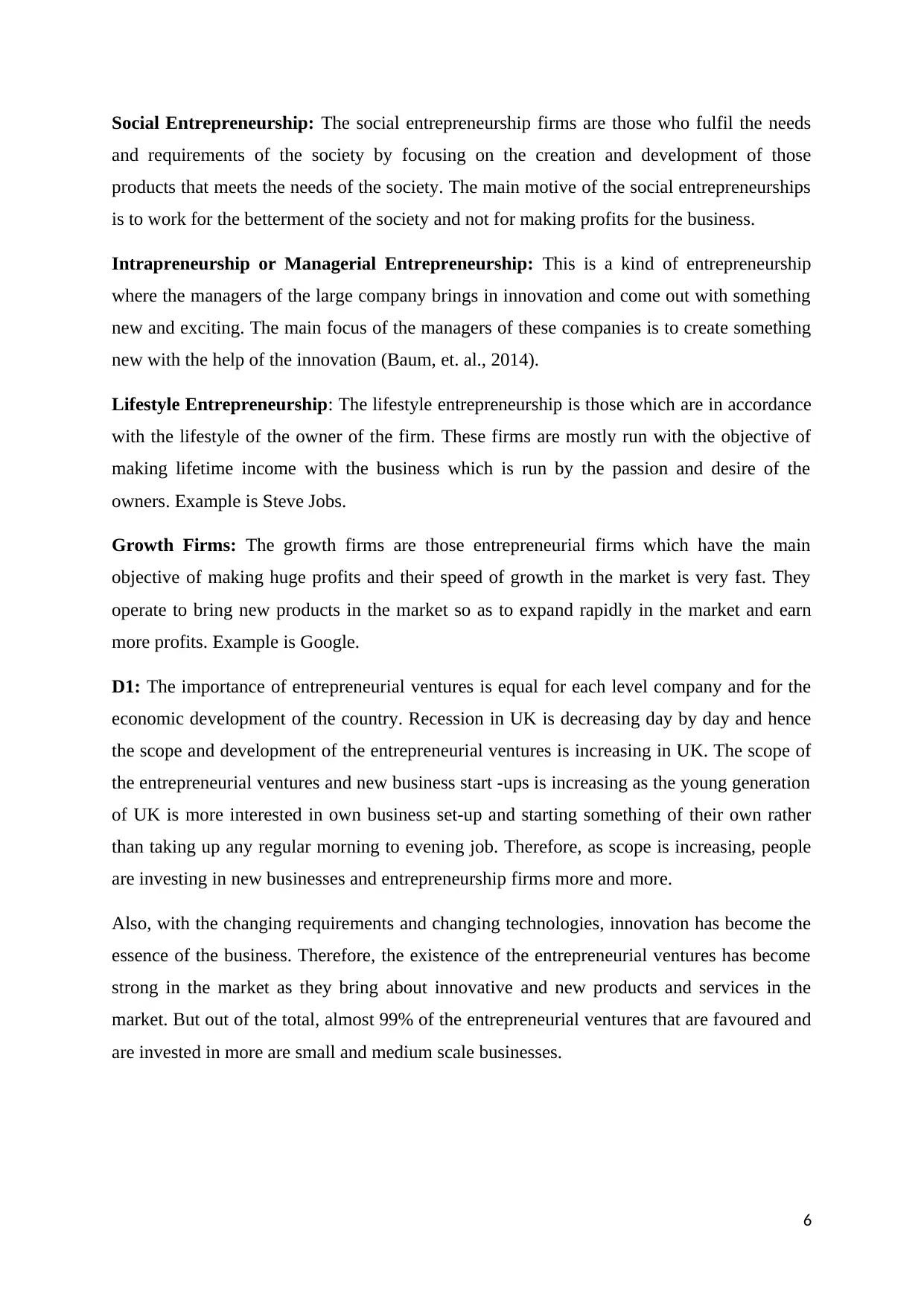
Social Entrepreneurship: The social entrepreneurship firms are those who fulfil the needs
and requirements of the society by focusing on the creation and development of those
products that meets the needs of the society. The main motive of the social entrepreneurships
is to work for the betterment of the society and not for making profits for the business.
Intrapreneurship or Managerial Entrepreneurship: This is a kind of entrepreneurship
where the managers of the large company brings in innovation and come out with something
new and exciting. The main focus of the managers of these companies is to create something
new with the help of the innovation (Baum, et. al., 2014).
Lifestyle Entrepreneurship: The lifestyle entrepreneurship is those which are in accordance
with the lifestyle of the owner of the firm. These firms are mostly run with the objective of
making lifetime income with the business which is run by the passion and desire of the
owners. Example is Steve Jobs.
Growth Firms: The growth firms are those entrepreneurial firms which have the main
objective of making huge profits and their speed of growth in the market is very fast. They
operate to bring new products in the market so as to expand rapidly in the market and earn
more profits. Example is Google.
D1: The importance of entrepreneurial ventures is equal for each level company and for the
economic development of the country. Recession in UK is decreasing day by day and hence
the scope and development of the entrepreneurial ventures is increasing in UK. The scope of
the entrepreneurial ventures and new business start -ups is increasing as the young generation
of UK is more interested in own business set-up and starting something of their own rather
than taking up any regular morning to evening job. Therefore, as scope is increasing, people
are investing in new businesses and entrepreneurship firms more and more.
Also, with the changing requirements and changing technologies, innovation has become the
essence of the business. Therefore, the existence of the entrepreneurial ventures has become
strong in the market as they bring about innovative and new products and services in the
market. But out of the total, almost 99% of the entrepreneurial ventures that are favoured and
are invested in more are small and medium scale businesses.
6
and requirements of the society by focusing on the creation and development of those
products that meets the needs of the society. The main motive of the social entrepreneurships
is to work for the betterment of the society and not for making profits for the business.
Intrapreneurship or Managerial Entrepreneurship: This is a kind of entrepreneurship
where the managers of the large company brings in innovation and come out with something
new and exciting. The main focus of the managers of these companies is to create something
new with the help of the innovation (Baum, et. al., 2014).
Lifestyle Entrepreneurship: The lifestyle entrepreneurship is those which are in accordance
with the lifestyle of the owner of the firm. These firms are mostly run with the objective of
making lifetime income with the business which is run by the passion and desire of the
owners. Example is Steve Jobs.
Growth Firms: The growth firms are those entrepreneurial firms which have the main
objective of making huge profits and their speed of growth in the market is very fast. They
operate to bring new products in the market so as to expand rapidly in the market and earn
more profits. Example is Google.
D1: The importance of entrepreneurial ventures is equal for each level company and for the
economic development of the country. Recession in UK is decreasing day by day and hence
the scope and development of the entrepreneurial ventures is increasing in UK. The scope of
the entrepreneurial ventures and new business start -ups is increasing as the young generation
of UK is more interested in own business set-up and starting something of their own rather
than taking up any regular morning to evening job. Therefore, as scope is increasing, people
are investing in new businesses and entrepreneurship firms more and more.
Also, with the changing requirements and changing technologies, innovation has become the
essence of the business. Therefore, the existence of the entrepreneurial ventures has become
strong in the market as they bring about innovative and new products and services in the
market. But out of the total, almost 99% of the entrepreneurial ventures that are favoured and
are invested in more are small and medium scale businesses.
6
⊘ This is a preview!⊘
Do you want full access?
Subscribe today to unlock all pages.

Trusted by 1+ million students worldwide

P2. Explore the similarities and differences between entrepreneurial ventures.
Entrepreneuria
l Venture
Kind of Business Goal Capital
Provider
Outcomes
Small Business The small businesses
are generally owned by
a single individual who
runs the business with
the objective of earning
bread for his/her
family. Example are
retail stores, painters,
carpenters, plumbers
etc.
Grow into a
lifelong business
which can be
owned by the
coming future
generations of the
family in order to
make profit.
The capital is
provided by the
personal funds,
friends, family
or small bank
loans.
Small businesses are
not large employers.
However, they
provide items and
services that are
necessary for the
daily lives of the
society.
Lifestyle Firms Lifestyle Firms are the
enterprises which are
run by the passion,
willingness and desire
of the owner in order to
make lifelong business
earnings and sustain in
the market (Carter &
Evans, 2012).
The main
objective is to
make lifelong
profits and
earnings through
self -passion and
expertise in
business.
Most of the
capital is
provided by the
investors.
Lifestyle firms
operate on small
scale and hence does
not provide
employment.
However, the
products and
services provided by
them enhance the
quality of lives of
people of society and
earn lifelong
earnings for the
owner of the
business.
7
Entrepreneuria
l Venture
Kind of Business Goal Capital
Provider
Outcomes
Small Business The small businesses
are generally owned by
a single individual who
runs the business with
the objective of earning
bread for his/her
family. Example are
retail stores, painters,
carpenters, plumbers
etc.
Grow into a
lifelong business
which can be
owned by the
coming future
generations of the
family in order to
make profit.
The capital is
provided by the
personal funds,
friends, family
or small bank
loans.
Small businesses are
not large employers.
However, they
provide items and
services that are
necessary for the
daily lives of the
society.
Lifestyle Firms Lifestyle Firms are the
enterprises which are
run by the passion,
willingness and desire
of the owner in order to
make lifelong business
earnings and sustain in
the market (Carter &
Evans, 2012).
The main
objective is to
make lifelong
profits and
earnings through
self -passion and
expertise in
business.
Most of the
capital is
provided by the
investors.
Lifestyle firms
operate on small
scale and hence does
not provide
employment.
However, the
products and
services provided by
them enhance the
quality of lives of
people of society and
earn lifelong
earnings for the
owner of the
business.
7
Paraphrase This Document
Need a fresh take? Get an instant paraphrase of this document with our AI Paraphraser

Social These are the
businesses which takes
the help of the
innovation in order to
make world a better
living place.
To make a huge
impact on the
society.
Their capital
providers are in
accordance with
their size and
structure.
Improves the lives of
the people of the
society by bringing
change and impact
on society.
Large These are the firms
having more than 500
employees working for
them For example:
Large corporation
companies.
Their main
objective is to
make huge profits
for the company
as well as for its
shareholders.
Tax Credits or
subsidiaries
(Carter &
Evans, 2012).
They are highly
recognised in the
society as major
brands and provide
employment on large
scale.
Scalable or
High Growth
Firms
These are the
companies that have
the potential to bring
change in the world
based on their
technology based
products and services.
To create huge
amount of wealth
for the
shareholders
through
acquisition or
other ways.
Angel Investors,
Banks etc.
They create
economic impact by
generating huge
revenue and
employment
opportunities (Carter
& Evans, 2012).
8
businesses which takes
the help of the
innovation in order to
make world a better
living place.
To make a huge
impact on the
society.
Their capital
providers are in
accordance with
their size and
structure.
Improves the lives of
the people of the
society by bringing
change and impact
on society.
Large These are the firms
having more than 500
employees working for
them For example:
Large corporation
companies.
Their main
objective is to
make huge profits
for the company
as well as for its
shareholders.
Tax Credits or
subsidiaries
(Carter &
Evans, 2012).
They are highly
recognised in the
society as major
brands and provide
employment on large
scale.
Scalable or
High Growth
Firms
These are the
companies that have
the potential to bring
change in the world
based on their
technology based
products and services.
To create huge
amount of wealth
for the
shareholders
through
acquisition or
other ways.
Angel Investors,
Banks etc.
They create
economic impact by
generating huge
revenue and
employment
opportunities (Carter
& Evans, 2012).
8
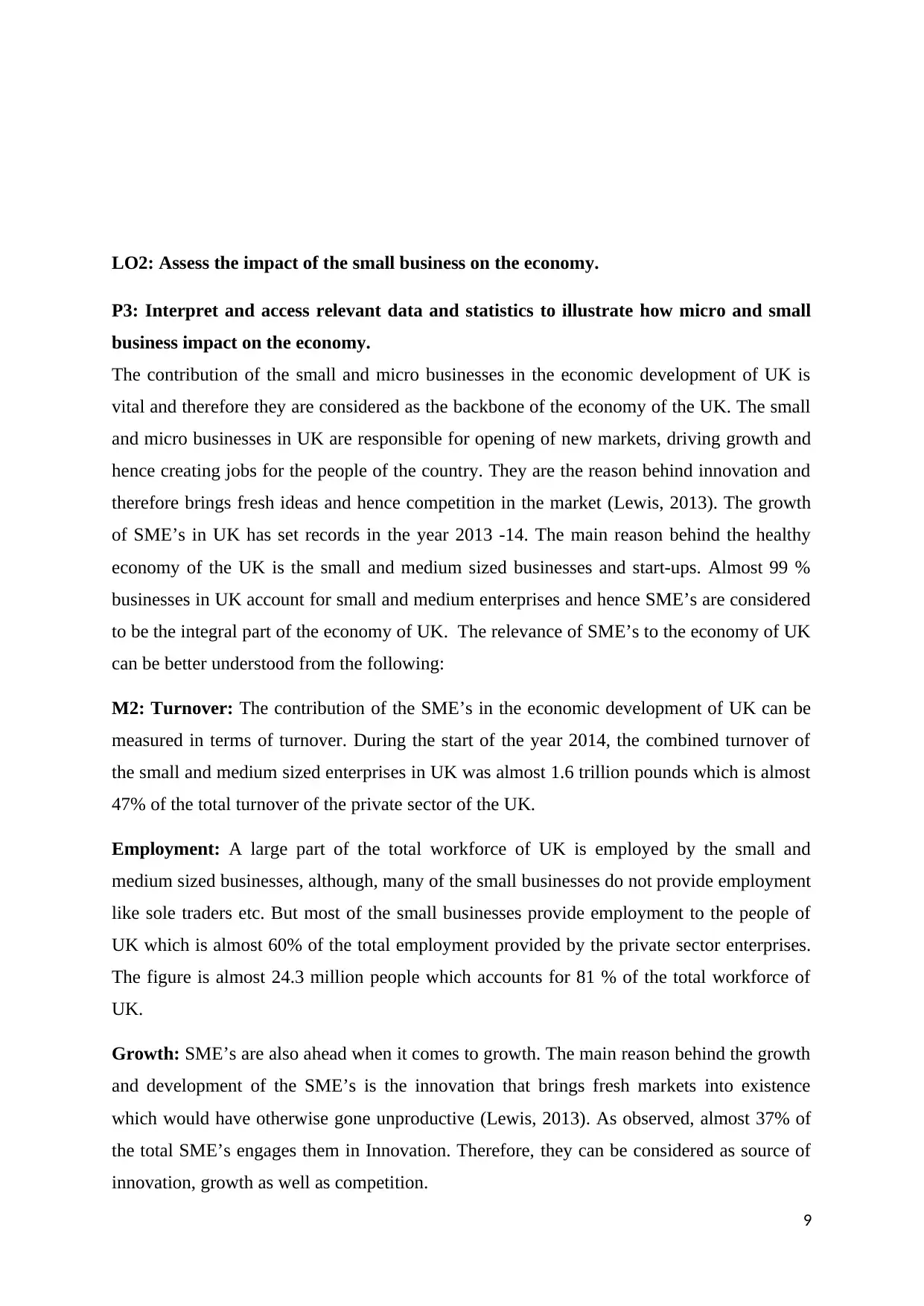
LO2: Assess the impact of the small business on the economy.
P3: Interpret and access relevant data and statistics to illustrate how micro and small
business impact on the economy.
The contribution of the small and micro businesses in the economic development of UK is
vital and therefore they are considered as the backbone of the economy of the UK. The small
and micro businesses in UK are responsible for opening of new markets, driving growth and
hence creating jobs for the people of the country. They are the reason behind innovation and
therefore brings fresh ideas and hence competition in the market (Lewis, 2013). The growth
of SME’s in UK has set records in the year 2013 -14. The main reason behind the healthy
economy of the UK is the small and medium sized businesses and start-ups. Almost 99 %
businesses in UK account for small and medium enterprises and hence SME’s are considered
to be the integral part of the economy of UK. The relevance of SME’s to the economy of UK
can be better understood from the following:
M2: Turnover: The contribution of the SME’s in the economic development of UK can be
measured in terms of turnover. During the start of the year 2014, the combined turnover of
the small and medium sized enterprises in UK was almost 1.6 trillion pounds which is almost
47% of the total turnover of the private sector of the UK.
Employment: A large part of the total workforce of UK is employed by the small and
medium sized businesses, although, many of the small businesses do not provide employment
like sole traders etc. But most of the small businesses provide employment to the people of
UK which is almost 60% of the total employment provided by the private sector enterprises.
The figure is almost 24.3 million people which accounts for 81 % of the total workforce of
UK.
Growth: SME’s are also ahead when it comes to growth. The main reason behind the growth
and development of the SME’s is the innovation that brings fresh markets into existence
which would have otherwise gone unproductive (Lewis, 2013). As observed, almost 37% of
the total SME’s engages them in Innovation. Therefore, they can be considered as source of
innovation, growth as well as competition.
9
P3: Interpret and access relevant data and statistics to illustrate how micro and small
business impact on the economy.
The contribution of the small and micro businesses in the economic development of UK is
vital and therefore they are considered as the backbone of the economy of the UK. The small
and micro businesses in UK are responsible for opening of new markets, driving growth and
hence creating jobs for the people of the country. They are the reason behind innovation and
therefore brings fresh ideas and hence competition in the market (Lewis, 2013). The growth
of SME’s in UK has set records in the year 2013 -14. The main reason behind the healthy
economy of the UK is the small and medium sized businesses and start-ups. Almost 99 %
businesses in UK account for small and medium enterprises and hence SME’s are considered
to be the integral part of the economy of UK. The relevance of SME’s to the economy of UK
can be better understood from the following:
M2: Turnover: The contribution of the SME’s in the economic development of UK can be
measured in terms of turnover. During the start of the year 2014, the combined turnover of
the small and medium sized enterprises in UK was almost 1.6 trillion pounds which is almost
47% of the total turnover of the private sector of the UK.
Employment: A large part of the total workforce of UK is employed by the small and
medium sized businesses, although, many of the small businesses do not provide employment
like sole traders etc. But most of the small businesses provide employment to the people of
UK which is almost 60% of the total employment provided by the private sector enterprises.
The figure is almost 24.3 million people which accounts for 81 % of the total workforce of
UK.
Growth: SME’s are also ahead when it comes to growth. The main reason behind the growth
and development of the SME’s is the innovation that brings fresh markets into existence
which would have otherwise gone unproductive (Lewis, 2013). As observed, almost 37% of
the total SME’s engages them in Innovation. Therefore, they can be considered as source of
innovation, growth as well as competition.
9
⊘ This is a preview!⊘
Do you want full access?
Subscribe today to unlock all pages.

Trusted by 1+ million students worldwide
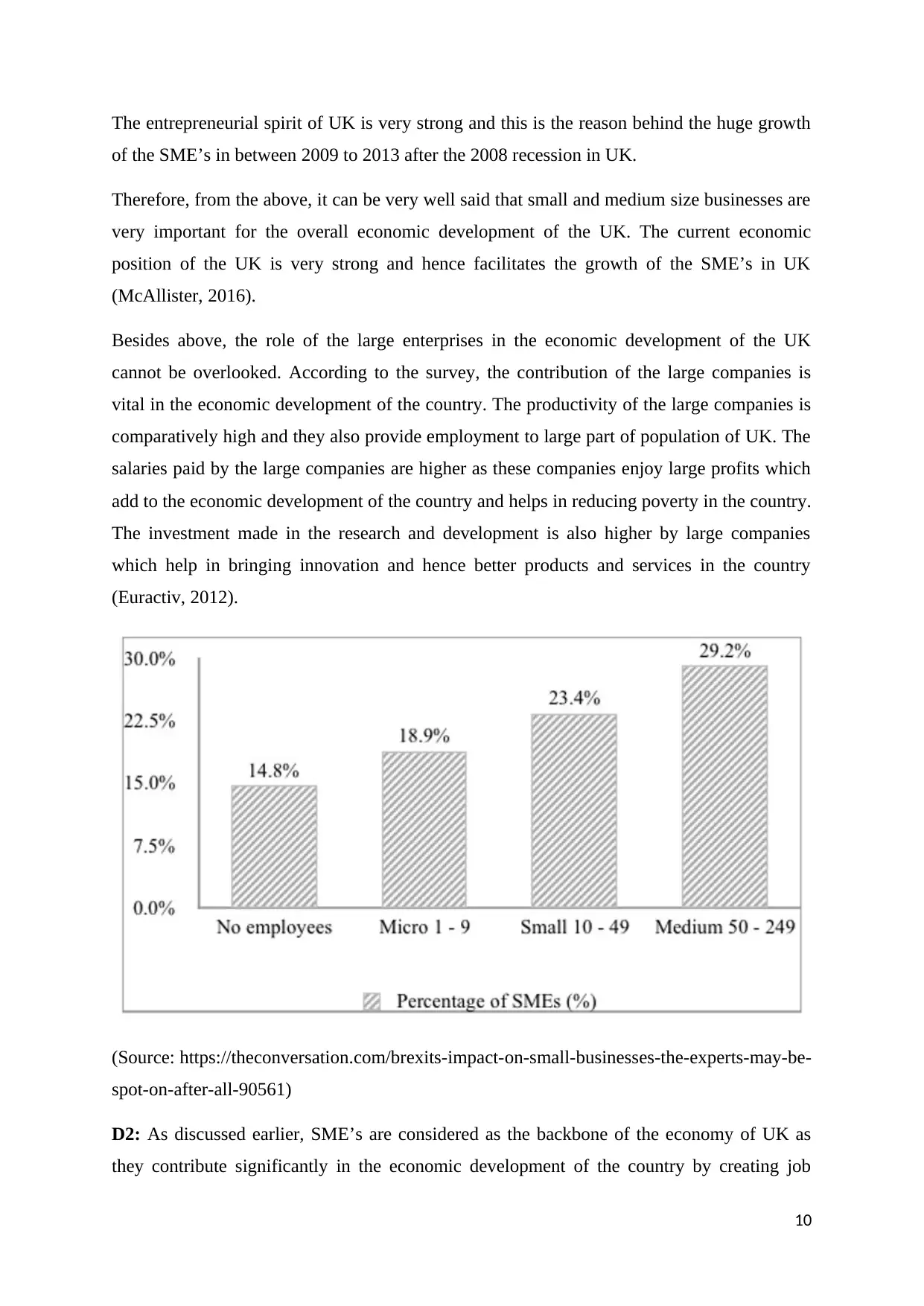
The entrepreneurial spirit of UK is very strong and this is the reason behind the huge growth
of the SME’s in between 2009 to 2013 after the 2008 recession in UK.
Therefore, from the above, it can be very well said that small and medium size businesses are
very important for the overall economic development of the UK. The current economic
position of the UK is very strong and hence facilitates the growth of the SME’s in UK
(McAllister, 2016).
Besides above, the role of the large enterprises in the economic development of the UK
cannot be overlooked. According to the survey, the contribution of the large companies is
vital in the economic development of the country. The productivity of the large companies is
comparatively high and they also provide employment to large part of population of UK. The
salaries paid by the large companies are higher as these companies enjoy large profits which
add to the economic development of the country and helps in reducing poverty in the country.
The investment made in the research and development is also higher by large companies
which help in bringing innovation and hence better products and services in the country
(Euractiv, 2012).
(Source: https://theconversation.com/brexits-impact-on-small-businesses-the-experts-may-be-
spot-on-after-all-90561)
D2: As discussed earlier, SME’s are considered as the backbone of the economy of UK as
they contribute significantly in the economic development of the country by creating job
10
of the SME’s in between 2009 to 2013 after the 2008 recession in UK.
Therefore, from the above, it can be very well said that small and medium size businesses are
very important for the overall economic development of the UK. The current economic
position of the UK is very strong and hence facilitates the growth of the SME’s in UK
(McAllister, 2016).
Besides above, the role of the large enterprises in the economic development of the UK
cannot be overlooked. According to the survey, the contribution of the large companies is
vital in the economic development of the country. The productivity of the large companies is
comparatively high and they also provide employment to large part of population of UK. The
salaries paid by the large companies are higher as these companies enjoy large profits which
add to the economic development of the country and helps in reducing poverty in the country.
The investment made in the research and development is also higher by large companies
which help in bringing innovation and hence better products and services in the country
(Euractiv, 2012).
(Source: https://theconversation.com/brexits-impact-on-small-businesses-the-experts-may-be-
spot-on-after-all-90561)
D2: As discussed earlier, SME’s are considered as the backbone of the economy of UK as
they contribute significantly in the economic development of the country by creating job
10
Paraphrase This Document
Need a fresh take? Get an instant paraphrase of this document with our AI Paraphraser
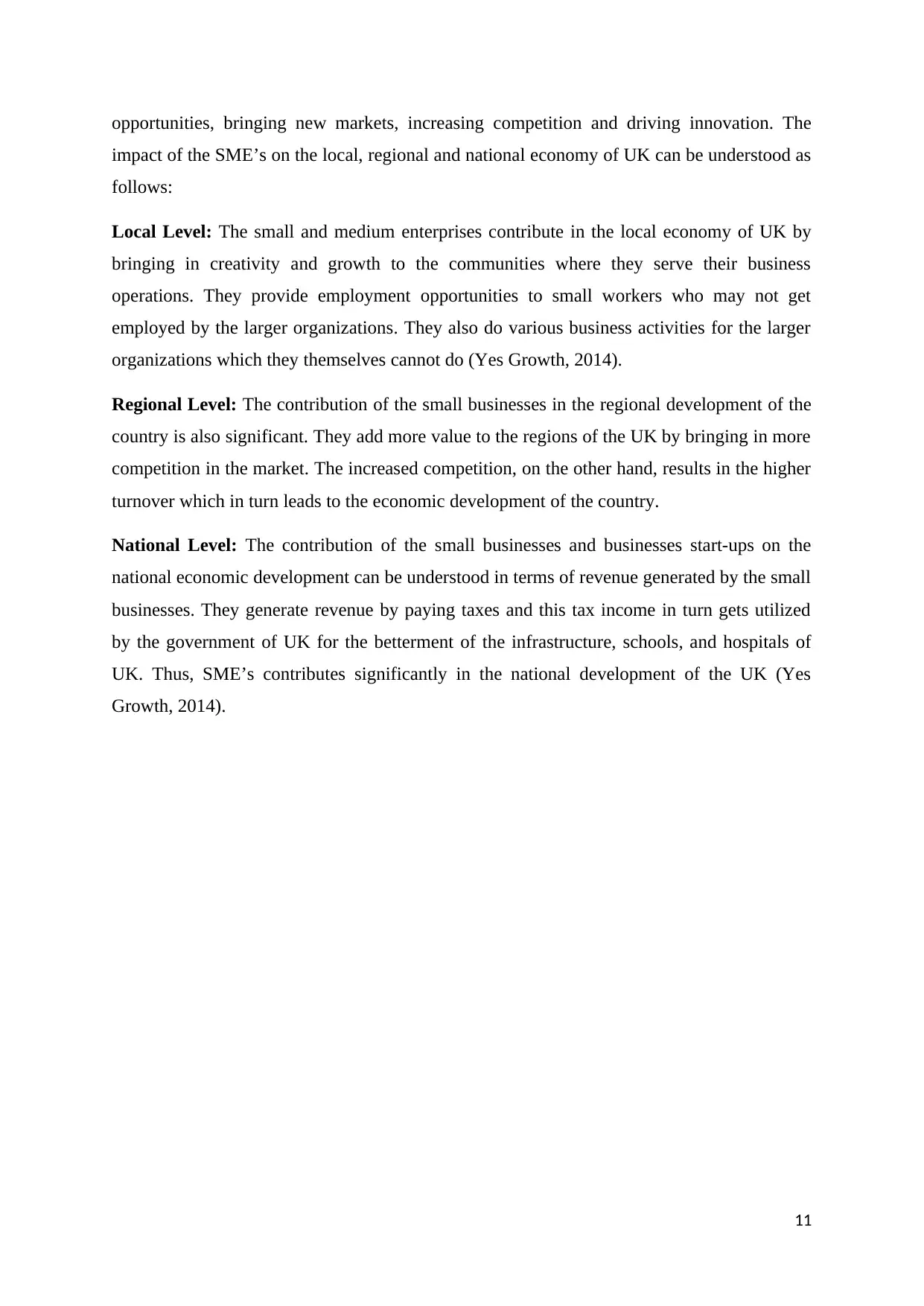
opportunities, bringing new markets, increasing competition and driving innovation. The
impact of the SME’s on the local, regional and national economy of UK can be understood as
follows:
Local Level: The small and medium enterprises contribute in the local economy of UK by
bringing in creativity and growth to the communities where they serve their business
operations. They provide employment opportunities to small workers who may not get
employed by the larger organizations. They also do various business activities for the larger
organizations which they themselves cannot do (Yes Growth, 2014).
Regional Level: The contribution of the small businesses in the regional development of the
country is also significant. They add more value to the regions of the UK by bringing in more
competition in the market. The increased competition, on the other hand, results in the higher
turnover which in turn leads to the economic development of the country.
National Level: The contribution of the small businesses and businesses start-ups on the
national economic development can be understood in terms of revenue generated by the small
businesses. They generate revenue by paying taxes and this tax income in turn gets utilized
by the government of UK for the betterment of the infrastructure, schools, and hospitals of
UK. Thus, SME’s contributes significantly in the national development of the UK (Yes
Growth, 2014).
11
impact of the SME’s on the local, regional and national economy of UK can be understood as
follows:
Local Level: The small and medium enterprises contribute in the local economy of UK by
bringing in creativity and growth to the communities where they serve their business
operations. They provide employment opportunities to small workers who may not get
employed by the larger organizations. They also do various business activities for the larger
organizations which they themselves cannot do (Yes Growth, 2014).
Regional Level: The contribution of the small businesses in the regional development of the
country is also significant. They add more value to the regions of the UK by bringing in more
competition in the market. The increased competition, on the other hand, results in the higher
turnover which in turn leads to the economic development of the country.
National Level: The contribution of the small businesses and businesses start-ups on the
national economic development can be understood in terms of revenue generated by the small
businesses. They generate revenue by paying taxes and this tax income in turn gets utilized
by the government of UK for the betterment of the infrastructure, schools, and hospitals of
UK. Thus, SME’s contributes significantly in the national development of the UK (Yes
Growth, 2014).
11
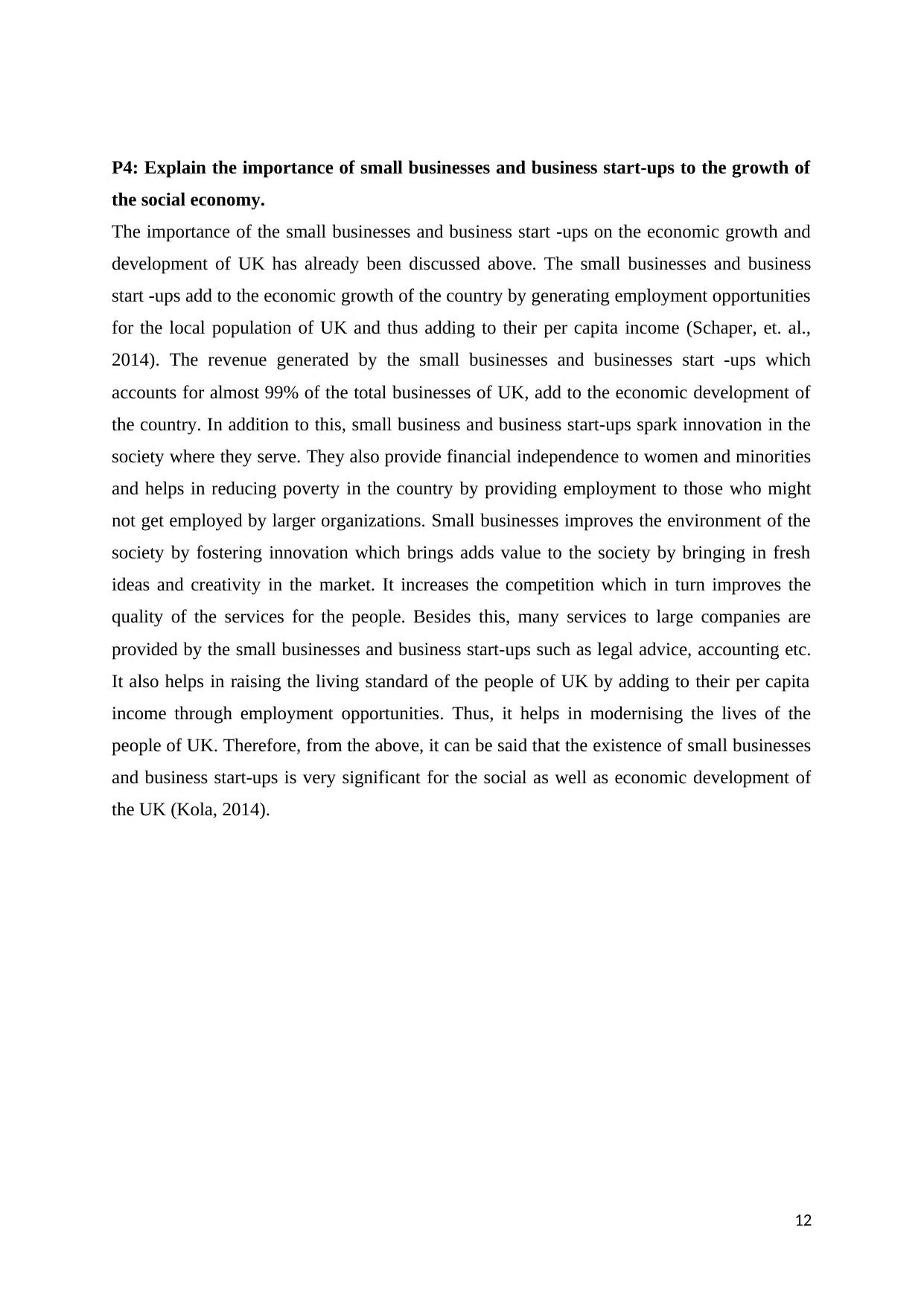
P4: Explain the importance of small businesses and business start-ups to the growth of
the social economy.
The importance of the small businesses and business start -ups on the economic growth and
development of UK has already been discussed above. The small businesses and business
start -ups add to the economic growth of the country by generating employment opportunities
for the local population of UK and thus adding to their per capita income (Schaper, et. al.,
2014). The revenue generated by the small businesses and businesses start -ups which
accounts for almost 99% of the total businesses of UK, add to the economic development of
the country. In addition to this, small business and business start-ups spark innovation in the
society where they serve. They also provide financial independence to women and minorities
and helps in reducing poverty in the country by providing employment to those who might
not get employed by larger organizations. Small businesses improves the environment of the
society by fostering innovation which brings adds value to the society by bringing in fresh
ideas and creativity in the market. It increases the competition which in turn improves the
quality of the services for the people. Besides this, many services to large companies are
provided by the small businesses and business start-ups such as legal advice, accounting etc.
It also helps in raising the living standard of the people of UK by adding to their per capita
income through employment opportunities. Thus, it helps in modernising the lives of the
people of UK. Therefore, from the above, it can be said that the existence of small businesses
and business start-ups is very significant for the social as well as economic development of
the UK (Kola, 2014).
12
the social economy.
The importance of the small businesses and business start -ups on the economic growth and
development of UK has already been discussed above. The small businesses and business
start -ups add to the economic growth of the country by generating employment opportunities
for the local population of UK and thus adding to their per capita income (Schaper, et. al.,
2014). The revenue generated by the small businesses and businesses start -ups which
accounts for almost 99% of the total businesses of UK, add to the economic development of
the country. In addition to this, small business and business start-ups spark innovation in the
society where they serve. They also provide financial independence to women and minorities
and helps in reducing poverty in the country by providing employment to those who might
not get employed by larger organizations. Small businesses improves the environment of the
society by fostering innovation which brings adds value to the society by bringing in fresh
ideas and creativity in the market. It increases the competition which in turn improves the
quality of the services for the people. Besides this, many services to large companies are
provided by the small businesses and business start-ups such as legal advice, accounting etc.
It also helps in raising the living standard of the people of UK by adding to their per capita
income through employment opportunities. Thus, it helps in modernising the lives of the
people of UK. Therefore, from the above, it can be said that the existence of small businesses
and business start-ups is very significant for the social as well as economic development of
the UK (Kola, 2014).
12
⊘ This is a preview!⊘
Do you want full access?
Subscribe today to unlock all pages.

Trusted by 1+ million students worldwide
1 out of 21
Related Documents
Your All-in-One AI-Powered Toolkit for Academic Success.
+13062052269
info@desklib.com
Available 24*7 on WhatsApp / Email
![[object Object]](/_next/static/media/star-bottom.7253800d.svg)
Unlock your academic potential
Copyright © 2020–2026 A2Z Services. All Rights Reserved. Developed and managed by ZUCOL.



